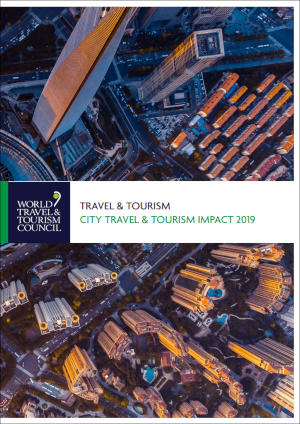Ungated Post | 20 Dec 2019
City Travel & Tourism Impact 2019

WTTC’s annual City Travel & Tourism Economic Impact Report quantifies the economic contribution of Travel & Tourism in 73 cities around the world. This year’s edition also highlights successful initiatives, strategies and policies that have been implemented by cities. Over half (55%) of the world’s population lives in urban areas. Cities have become global economic hubs, driving growth and innovation, while attracting more and more people who come to live, do business and discover them. Not surprisingly, therefore, nearly half of global international travel takes place in cities.
Key highlights include:
- Travel & Tourism in these 73 cities directly accounted for 4.4% of city GDP (US$ 691 billion) and 17 million jobs, or 5.7% of total employment in these cities in 2018. – International visitor spending is more important to cities than it usually is to countries as a whole. International visitors accounted for 45% of tourism spending across the 73 cities in our study, compared to just 29% for economies worldwide.
- Revenues from international visitors will in many cases pay for infrastructure projects, the provision of public workers and services that improve the quality of life for residents.
- Cities which are over-reliant on domestic or international demand are more exposed to economic and geo-political risks.
- A few cities demonstrate a more balanced split between domestic and international demand, including Cancún, Munich, Cairo, Tokyo, Mecca, San Francisco and New York.
- Direct Travel & Tourism GDP across 73 cities grew by 3.6% in 2018, above the overall city economy growth of 3.0%.
- Six of the top ten largest cities in terms of the size of Travel & Tourism sector (as measured by direct Travel & Tourism GDP) are in Asia-Pacific. As of 2018, Shanghai, Paris and Beijing have the largest Travel & Tourism economies of the cities in the study.
- Achieving sustainable growth for Travel & Tourism in cities requires a focus that extends far beyond the sector itself and one that is integrated into the broader urban agenda.
Our consulting team at Tourism Economics are the world’s leading analysts of the global tourism and travel sector. They combine their expert insight with our state-of-the-art economic models and tools to answer the crucial questions facing our clients. Lead consultants on the project were:
Oxford Economics’ team is expert at applying advanced economic tools that provide valuable insights into today’s most pressing business, financial, and policy issues.
To find out more about our capabilities, contact:
EMEA
David Goodger
+44 (0)1865 268 928
Email
Americas
John Levis
+1 610 995 9600
Email
Asia
Adam Sacks
+1 (610) 995 9401
Email
Related Services

Post
The Economic Footprint of JLR in the UK
This report examines the economic footprint of JLR in the United Kingdom in 2024. The analysis is conducted both at the national level, as well as on the West Midlands and North West regions, where JLR’s main facilities are located.
Find Out More
Post
Airbnb’s Economic Contribution to APAC in 2024: GDP, Jobs, and Regional Impact
Airbnb's platform connects hosts across Asia Pacific (APAC) with travellers from around the world. Oxford Economics was commissioned by Airbnb to quantify its economic footprint in 10 APAC markets in 2024.
Find Out More
Post
Economic Insights: Airbnb’s Contribution Through the Lens of Oxford Economics
Oxford Economics Australia delivered a tailored economic impact assessment for Airbnb, including GDP contribution modelling, job creation analytics, guest‑spend segmentation, and regional tourism dispersion insights to underpin Airbnb’s stakeholder communications and strategic growth initiatives.
Find Out More